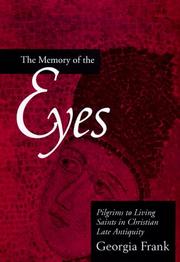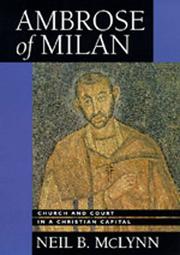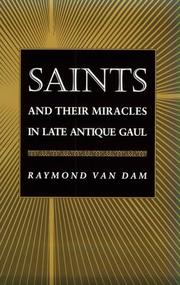| Listing 1 - 3 of 3 |
Sort by
|

ISBN: 0520924355 1597347426 9780520924352 0585394687 9780585394688 0520222059 9780520222052 9781597347426 Year: 2000 Publisher: Berkeley University of California Press
Abstract | Keywords | Export | Availability | Bookmark
 Loading...
Loading...Choose an application
- Reference Manager
- EndNote
- RefWorks (Direct export to RefWorks)
Pilgrims in the deserts of Egypt and the holy land during the fourth and fifth centuries A.D. often reported visiting holy people as part of their tours of holy places. This is the first comprehensive study of pilgrimage to these famous ascetics of late antique Christianity.
Christian pilgrims and pilgrimages --- Monasticism and religious orders --- Monachism --- Monastic orders --- Monasticism and religious orders for men --- Monasticism and religious orders of men --- Orders, Monastic --- Orders, Religious --- Religious orders --- Brotherhoods --- Christian communities --- Brothers (Religious) --- Friars --- Monks --- Superiors, Religious --- History. --- Palladius, --- Historia monachorum in Aegypto. --- Vitae patrum. --- De vitis patrum liber secundus --- Liber de vitis patrum --- Kat' Aigypton tōn monachōn historia --- De vita sanctorum patrum

ISBN: 0520914554 0585139784 9780520914551 9780585139784 0520084616 9780520084612 Year: 1994 Publisher: Berkeley
Abstract | Keywords | Export | Availability | Bookmark
 Loading...
Loading...Choose an application
- Reference Manager
- EndNote
- RefWorks (Direct export to RefWorks)
In this new and illuminating interpretation of Ambrose, bishop of Milan from 374 to 397, Neil McLynn thoroughly sifts the evidence surrounding this very difficult personality. The result is a richly detailed interpretation of Ambrose's actions and writings that penetrates the bishop's painstaking presentation of self. McLynn succeeds in revealing Ambrose's manipulation of events without making him too Machiavellian. Having synthesized the vast complex of scholarship available on the late fourth century, McLynn also presents an impressive study of the politics and history of the Christian church and the Roman Empire in that period.Admirably and logically organized, the book traces the chronology of Ambrose's public activity and reconstructs important events in the fourth century. McLynn's zesty, lucid prose gives the reader a clear understanding of the complexities of Ambrose's life and career and of late Roman government.
Church and state --- Church history --- Apostolic Church --- Christianity --- Church, Apostolic --- Early Christianity --- Early church --- Primitive and early church --- Primitive Christianity --- Fathers of the church --- Great Apostasy (Mormon doctrine) --- Christianity and state --- Separation of church and state --- State and church --- State, The --- Ambrose, --- Ambrogio, --- Ambroise, --- Ambrosio, --- Ambrosius Mediolanensis, --- Ambrosius, --- Ambrosius von Mailand, --- Amvrosīĭ, --- Aurelio Ambrogio, --- Aurelius Ambrosius, --- Rome --- History --- Ambrogio --- Ambroise --- Ambrose --- Ambrosio --- Ambrosius Mediolanensis --- Ambrosius --- Ambrosius von Mailand --- Amvrosīĭ --- Aurelio Ambrogio --- Aurelius Ambrosius --- ambrose. --- auxentius. --- bishop of milan. --- bishop. --- catholic church. --- christian church. --- christian pliny. --- church doctrine. --- church history. --- church leaders. --- church politics. --- constantius. --- council of 355. --- council of aquileia. --- de fide. --- de spiritu sancto. --- easter crisis 386. --- exegesis. --- gratian. --- martyrs. --- palladius. --- penance. --- religion. --- religious leaders. --- rhetoric. --- roman emperors. --- roman empire. --- roman government. --- saint ambrose. --- saints lives. --- saints. --- sanctification. --- satyrus. --- theodosius. --- valentinian ii. --- western christianity.

ISBN: 0691021120 0691032335 9786613891181 1400821142 1283578735 9780691032337 9780691021126 9781400821143 1400819318 Year: 2011 Publisher: Princeton, NJ
Abstract | Keywords | Export | Availability | Bookmark
 Loading...
Loading...Choose an application
- Reference Manager
- EndNote
- RefWorks (Direct export to RefWorks)
Saints' cults, with their focus on miraculous healings and pilgrimages, were not only a distinctive feature of Christian religion in fifth-and sixth-century Gaul but also a vital force in political and social life. Here Raymond Van Dam uses accounts of miracles performed by SS. Martin, Julian, and Hilary to provide a vivid and comprehensive depiction of some of the most influential saints' cults. Viewed within the context of ongoing tensions between paganism and Christianity and between Frankish kings and bishops, these cults tell much about the struggle for authority, the forming of communities, and the concept of sin and redemption in late Roman Gaul. Van Dam begins by describing the origins of the three cults, and discusses the career of Bishop Gregory of Tours, who benefited from the support of various patron saints and in turn promoted their cults. He then treats the political and religious dimensions of healing miracles--including their relation to Catholic theology and their use by bishops to challenge royal authority--and of pilgrimages to saints' shrines. The miracle stories, collected mainly by Gregory of Tours, appear in their first complete English translations.
Christian pilgrims and pilgrimages --- Christian saints --- Saints chrétiens --- History --- Cult --- Culte --- Histoire --- Gaul --- Gaule --- Religious life and customs --- Vie religieuse --- History. --- 235.3*23 --- Hagiografie: miracula --- 235.3*23 Hagiografie: miracula --- Saints chrétiens --- Pilgrims and pilgrimages, Christian --- Christian shrines --- Pilgrims and pilgrimages --- Saints --- Canonization --- Cult&delete& --- Christian saints - Cult - France - History --- Christian pilgrims and pilgrimages - France - Tours - History --- Martinus ep. Turonensis --- Hilarius ep. Pictaviensis --- Iulianus ep. Cenomannensis --- Gregorius ep. Turonensis --- Aeneid. --- Alternative medicine. --- Amulet. --- Archdeacon. --- Ariamir. --- Arianism. --- Augustine of Hippo. --- Austrasia. --- Baptism of the Lord. --- Brioude. --- Burgundians. --- Burial. --- Caesarius. --- Catholicism. --- Chararic (Frankish king). --- Chlothar I. --- Chlothar II. --- Christianity. --- Church Fathers. --- Clergy. --- Confidant. --- Consecration. --- Deference. --- Desiderius. --- Dysentery. --- Easter. --- Eternal life (Christianity). --- Exorcism. --- Falernian wine. --- Folk healer. --- Fredegund. --- Generosity. --- Georgius. --- God. --- Great martyr. --- Gregorius. --- Gregory of Tours. --- Hagiography. --- Helladius. --- Heresy. --- His Family. --- Historian. --- Humility. --- Intercession. --- Jews. --- Late Antiquity. --- Lent. --- Leprosy. --- Literary criticism. --- Literature. --- Magnus Maximus. --- Marmoutier. --- Martin of Tours. --- Martyr. --- Matricula. --- Merovech. --- Merovingian dynasty. --- Monastery. --- Old Testament. --- Paganism. --- Palladius of Saintes. --- Patron saint. --- Paulinus of Nola. --- Penitential. --- Persecution. --- Peter and Paul. --- Piety. --- Poitiers. --- Pope Gregory I. --- Potion. --- Predestination. --- Procession. --- Putrefaction. --- Radegund. --- Relic. --- Reliquary. --- Remigius. --- Resurrection of the dead. --- Righteousness. --- Rite. --- Roman Gaul. --- Saint. --- School of Graduate Studies (SPS). --- Secularism. --- Self-healing. --- Silvester. --- Slavery. --- Spirituality. --- Suffragan bishop. --- Sulpicius Severus. --- Theodosius I. --- Theology. --- Tomb. --- Tours. --- True Cross. --- Veneration. --- Visigoths. --- Weidemann. --- Word of Faith. --- Writing.
| Listing 1 - 3 of 3 |
Sort by
|

 Search
Search Feedback
Feedback About UniCat
About UniCat  Help
Help News
News